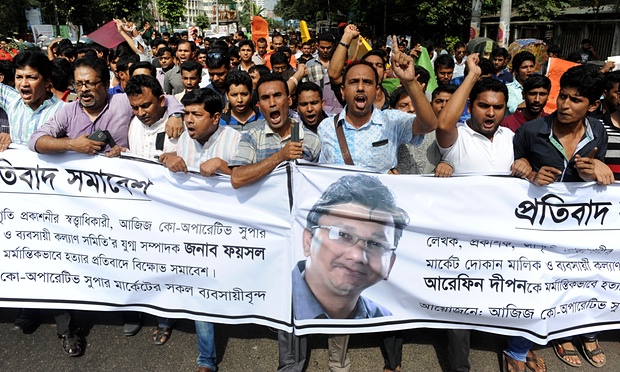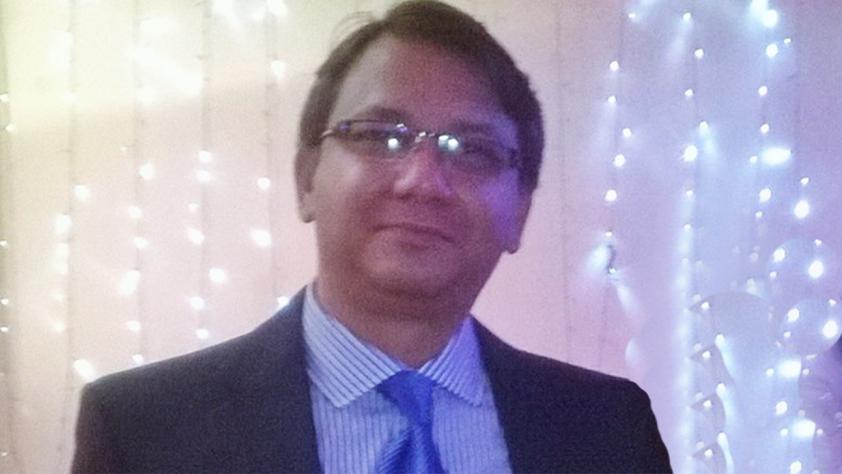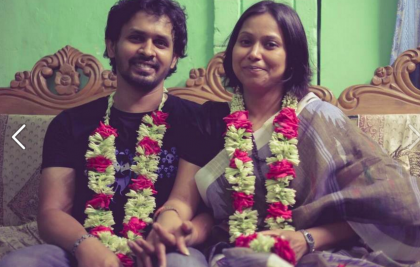

Published on 7 November 2015 in Blasphemy news
In the aftermath of a machete attack…
Even as more atheists are targeted in Bangladesh, leaving a secular publisher hacked to death at his place of business, the government responds by dismissing the killings as “isolated incidents” and blaming political opponents. As fears grow that the authorities have completely lost control of the situation, Islamist groups claim responsibility, and broaden the spectrum of targets they consider as “blasphemers”. End Blasphemy Laws looks at the aftermath of yet another machete attack in Bangladesh…
Last Saturday, 31 October, suspected Islamist militants carried out two machete and gun attacks, against two offices in different neighborhoods of Dhaka, the capital city of Bangladesh. They injured three men in the first attack: poet Tareq Rahim and publisher Ahmed Rashid Tutul were critically injured in the attack on Tutul’s publishing house, Shuddho-Shor, and an atheist blogger Ranadipam Basu was also hurt.

Faisal Arefin Dipan
In the second attack, the publisher Faisal Arefin Dipan was hacked to death. This attack also took place at his offices, of the publishing house Jagriti Prokashony.
Both publishers had printed books by humanist and freethinking author Avijit Roy, who was himself killed earlier this year.
Police said, “From what we have come to know, the assailants came in posing as book customers. Then they attacked with machetes and left leaving the office locked from outside.”
The attack follows four murders since February this year of humanist and atheist writers and bloggers, as well as a string of recent attacks on foreigners, including the murder of Japanese national Kunio Hoshi in Rangpur, and a bomb attack on the Shia community during Ashura that left one dead.
The community responds
In Bangladesh, the attacks last weekend sparked days of protests, including street marches and symbolic book burnings:
Hundreds of people, including writers, publishers and bookshop owners, took to the streets of the capital, Dhaka, on Monday to protest against what they said was government inaction over a string of attacks, including the murder on Saturday of a publisher of secular books.
“This is not an isolated incident. They first started killing authors, then the bloggers and now they’ve targeted the publishers,” Mustafa Selim, head of the Bangladesh Creative Publishers Society, told reporters.
… “The people who have so far fallen victim to the attacks are thinking people, those who believe in freedom of expression, and those who believe in secular values. A series of killings have taken place but now the focus is on publishers … I feel absolutely traumatised,” said Mohiuddin Ahmed, a publisher in Dhaka.
Protests continued into the week:
About 1,000 Bangladeshi authors and teachers marched through the streets of the capital on Tuesday… “No one is safe. First they killed bloggers. Now they are targeting publishers. Soon they will attack anyone who is progressive-minded,” said Khaledur Rahman, an author who is himself facing a death threat.
And there was a parallel protest in London, UK.
Huffington Post Live covered the attacks with a section including a journalist, a blogger, an International PEN member, and Michael De Dora from our partners at Center for Inquiry (US).
Blogger Arifur Rahman was interviewed on the BBC.
With Bangladesh’s prime minister Sheik Hasina visiting Netherlands, the Dutch Humanist Association (Humanistisch Verbond) called on their own prime minister in an open letter to raise the anti-atheist murders with Hasina, to protest the Bangladesh government’s handling of the murders, and call for greater freedom of expression. Dutch Humanist president Boris van der Ham commented, “Secular writers, bloggers, thinkers and publishers are literally outlawed in Bangladesh. This year already five of them have literally been hacked to death by Islamist extremists. The Bangladeshi government is doing too little to prevent this.”
Center for Inquiry Canada (CFIC) condemned the attacks, and given that the poet Tareq Rahim (critically injured in the first attack) had recently married a Canadian citizen, Monika Mistry, they called on the Canadian government to work to ensure his safety and that of all those under threat.
Mistry has told CFIC, “I am so frightened for Tareq. I am most afraid that when he is released from hospital that there are people waiting in the street to attack him again.”
… One of CFIC’s Bangladeshi contacts has asked, “Is it so difficult for a country to accept these 40-50 endangered people?” CFIC and our humanist, secularist and human rights-oriented colleagues pass that question on to the Canadian government. Can Canada not find compassion for a minority targeted by religious terrorists – particularly those with Canadian connections.
Our partners at International Humanist and Ethical Union (IHEU) presented information about those who had been killed, condemned the attacks, and immediately expressed concerns about the response of the authorities so far, and the wider ramifications of the latest attacks.
“… How many more times must we see these bloody and callous acts of hatred before the authorities wake up to the true problem. Officials must stop threatening to arrest, and stop blaming atheists themselves for writing books and blogs. To victim-blame them will continue to empower the fundamentalist killers and undermine the very basis of secular democracy itself.
“Though there are many similarities with earlier outrages, today’s coordinated attacks may represent a significant emboldening and an up-step in the campaign to terrorize and silence the voices of humanists, atheists and secularists. The Bangaldeshi authorities must now accept that their appeasement of fundamentalist violence is not working, and is costing life after life.”
Evasion, blame and ducking responsibility: officials respond
And indeed, as predicted, the response by political officials has been yet more confusion, head-in-the-sand disavowal, and casting blame on political rivals (without apparently any shred of evidence).
First of all, Awami League joint general secretary Mahbub-ul Alam Hanif on Sunday cast aspersions on the father of the deceased, implying that Dipan’s father was himself an Islamist extremist. Dipan’s father, Dhaka University Bangla professor Abul Kashem Fazlul Haque, had said “I don’t want a trial for the killing of my son… What [benefit] would it be if the trial is done?” He was perhaps expressing doubt that a trial would ever take place (despite several arrests, no full trial has taken place for any of the killings so far) and doubted that the process would be effective or bring any benefit; but instead of a trial, he explicitly called for a more peaceful and inclusive politics. Bizarrely, joint general secretary Hanif took this as an opportunity to attack the grieving father, saying:
“May be, he [Faisal Arefin Dipan’s father] believes in the ideology the killers and that is why he does not want to bring the men of his own party to on trial… It is regrettable and shameful.”
Regrettable and shameful indeed, Hanif.
Home Minister Asaduzzaman Khan Kamal, ultimately responsible for the security of state, assured media that justice wold come soon (a weary phrase by now), but appeared to downplay both the seriousness of the incidents and the specific pattern of violence against secular thinkers, saying:
“Yesterday’s attacks are isolated incidents and such attacks also occur in other countries of the world…”
Perhaps most seriously of all, this was followed on Monday by an extraordinary politicized blame-game, straight from the mouth of the prime minister herself, Sheikh Hasina, implicating her political nemesis Khaleda Zia and linking the current killings to sensitive historical assassinations:
Prime Minister Sheikh Hasina alleged that Khaleda Zia was out on a killing mission assassinating Awami League leaders, activists, writers, publishers and foreigners in her bid to tarnish the country’s image abroad.
“The BNP leader has now engaged in a killing mission for tainting the country’s image, after being politically defeated in her efforts to topple the present government through killing people in the name of hartal and blockade,” the premiere said.
The PM came up with the allegations while addressing a public rally organised by the ruling Awami League at the city’s historic Suhrawardy Udyan, marking the Jail Killing Day commemorating the assassinations of four national leaders.
Back in November 3, 1975, four national leaders and heroes of the country’s Liberation War — Syed Nazrul Islam, Tajuddin Ahmed, Captain Mansur Ali and AHM Quamruzzaman — were assassinated inside Dhaka Central Jail.
… “After tarnishing the country’s image by killing foreigners, she has now engaged in assassinations,” the PM added.
Hasina said the BNP leader’s target is to assassinate AL leaders, activists, writers, publishers and foreigners.
“Whenever there has been any investigation into any killing, it was found that the killers were either engaged in Chhatra Shibir or Chhatra Dal politics during their student lives,” Hasina said.
What’s so extraordinary here is that if there were any evidence to this effect then of course Zia could be arrested, and yet none is presented, so this appears to be nothing but a diversionary and desperate political attack, entirely unhelpful to finding those responsible. It is also remarkable that the prime minister feels able to refer so confidently to “the killers” when the authorities have failed to actually convict anyone for any of the anti-atheist murders this year.
Claiming responsibility, broadening the threat
Statements posted on known Islamist social media accounts and sent to media in Bangladesh claimed responsibility on behalf of Ansar Al Islam 4, supposedly acting for al-Qaeda in the Indian Subcontinent (AQIS). In one statement, speaking of the two targeted publishers, they said:
These two apostates frequently published books in which, the honor of the prophet was violated. These two publishers were worse than the writers of such books, as they helped to propagate those books and paid the blasphemers handsome amount of money for writing them. These secular and atheist publishers waged war against the religion of Islam in every possible ways.
Every possible way… Beside, y’know, actually doing anything war-like.
From a second statement, the Dhaka Tribune quotes the first of the stated targets as:
(1) Those who insult or vilify Allah, the most High, our prophet Muhammad or the religion Islam.
Replying, perhaps, to the worldwide outrage against the string of attacks, the statement insists, “We are not targeting every atheist bloggers. We don’t have problem with other religions or beliefs but we will not tolerate anyone insulting prophet Muhammad. We are targeting those who are insulting our Prophet in the name of Atheism, Free Speech or Free Thinking.” The four bloggers killed this year wrote about civil rights issues, science, humanist values, secularism, free expression, social justice, and yes, sometimes questioned and criticised in some cases certain religious beliefs and practices. But of course, the content doesn’t really matter when it’s the blood-thirsty men with machetes who get to decide what counts as “insulting our Prophet”.
Worryingly, the list of those now ‘threatened’ goes on. It includes “Those who protect, help and support the above mentioned insulters financially, ideologically or through organizations”, effectively a warning to others not to speak out in defense of their murder victims or to do anything to help them. The list includes, “Those who don’t allow others to follow the rulings of the Islamic Shariah”, with helpful examples such as “teacher”, “leader of a certain area or locality or a political party”, “Judge, Advocate, Engineer or Doctor etc.” Anyone “who intentionally misrepresent[s] Islam in their writings or talks”; helpful examples include “well known writer”, “poet or free thinker or so called intellectuals”, “editor of a newspaper of magazine”, “actor, journalist, producer, director or actor [again] etc.” And of course, anyone opposing or “showing insolence” toward Sharia law, including political reformers, and anyone “spreading nudity, obscenity and shamefulness in the Muslim society”. Perhaps most vaguely in an already exhaustive list, we find, “Those who are actively trying to extinguish the light of Allah Almighty from this land.”
So, having started out seemingly trying to qualify the targets, “In short, the Mujahideen will target, by the permission of Allah, every apostates and enemies of Islam who are trying to insult Allah Almighty, our prophet Muhammad or the religion of Islam by any means.”
Whether or not these statements really are issued by someone directly connected to the killers is not possible to establish, though the change in last Saturday’s targets — from writers to publishers — does cohere with the broadening of the targets suggested in the text.
